If you’re looking to reduce your environmental impact and save money on your energy bills, investing in energy-efficient appliances is an excellent place to start. These appliances are designed to use less energy than traditional models while still providing the same level of performance. By choosing energy-efficient appliances, you can lower your carbon footprint and enjoy significant savings on your monthly energy bills.
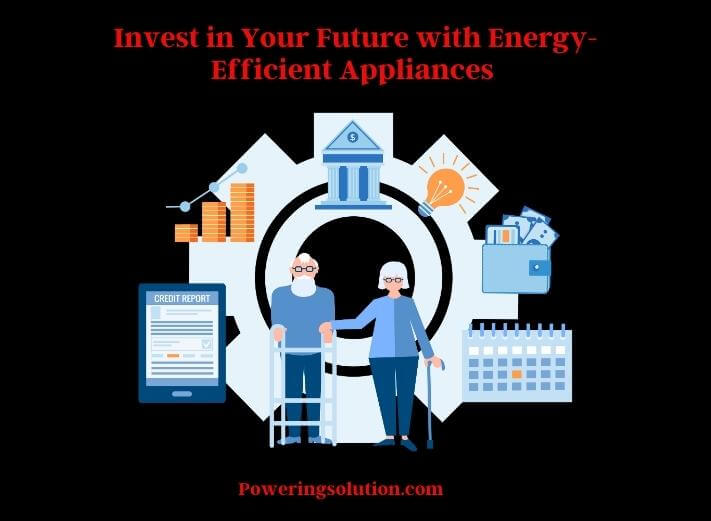
Not only do energy-efficient appliances save you money, but they can also increase the value of your home. Many homebuyers are looking for energy-efficient homes, and having energy-efficient appliances can be a significant selling point. Many utility companies and government programs offer rebates and incentives for investing in energy-efficient appliances, making it even more cost-effective to upgrade to these models.
How Energy-Efficient Appliances Work?
Energy-efficient appliances work by using advanced technologies and designs that reduce the amount of energy they consume while still delivering the same level of performance as traditional models. These appliances are designed to use less electricity, gas, or water, which not only reduces the amount of energy needed but also lowers your utility bills.
One of the primary ways energy-efficient appliances work is by using advanced insulation and sealing techniques to reduce energy loss. For example, an energy-efficient refrigerator may use thicker insulation and better door seals to keep cold air inside the fridge, reducing the need for the compressor to run as often. Similarly, an energy-efficient dishwasher may use more advanced washing technology, such as sensors that detect how dirty the dishes are and adjust the wash cycle accordingly, to use less water and energy.
Another way that energy-efficient appliances work is by using more efficient motors and compressors. These appliances are designed to run more efficiently, using less energy to accomplish the same task. For example, an energy-efficient washing machine may use a variable-speed motor that adjusts the spin speed based on the load size, while an energy-efficient air conditioner may use a compressor that runs at different speeds to match the cooling needs of your home.
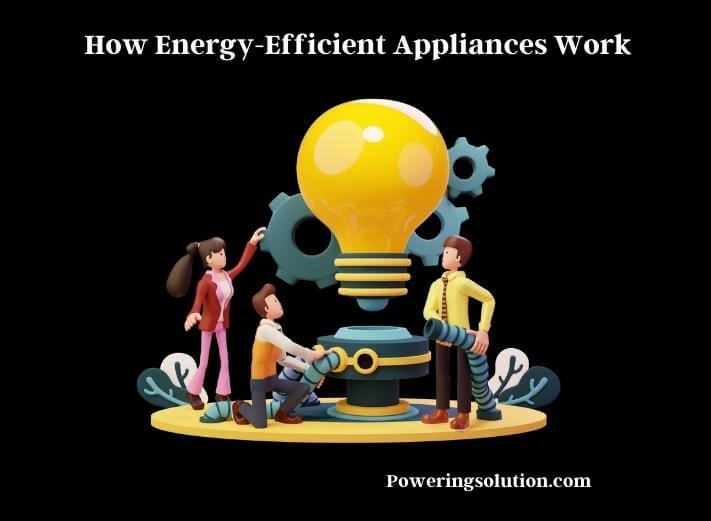
Some energy-efficient appliances use renewable energy sources, such as solar power or wind energy. These appliances are designed to harness the power of these renewable sources to operate, reducing their reliance on traditional energy sources and reducing your carbon footprint.
Different Types of Energy-Efficient Appliances
There are many types of energy-efficient appliances available on the market today.
Refrigerators
Energy-efficient refrigerators use advanced insulation and sealing techniques to keep cold air inside the fridge, reducing the amount of energy needed to keep the contents cool. They may also use more efficient compressors and motors.
Dishwashers
Energy-efficient dishwashers use advanced washing technology, such as sensors that detect how dirty the dishes are and adjust the wash cycle accordingly. They may also have features like delayed start and shorter cycles to save energy.
Washing Machines
Energy-efficient washing machines may use a variable-speed motor that adjusts the spin speed based on the load size. They may also have features like load sensors that detect how much water is needed for each load.
Dryers
Energy-efficient dryers use advanced technologies like moisture sensors to detect when the clothes are dry and stop the cycle. They may also use heat pumps to recycle heat from the dryer to save energy.
Air Conditioners
Energy-efficient air conditioners use more efficient compressors and motors, as well as advanced features like programmable thermostats and zone cooling to reduce energy consumption.
Water Heaters
Energy-efficient water heaters use advanced insulation and heating technology to reduce energy loss and heat water more efficiently. They may also use features like tankless heating to save energy.
Lighting
Energy-efficient lighting, such as LED bulbs, uses much less energy than traditional incandescent bulbs and can last much longer.
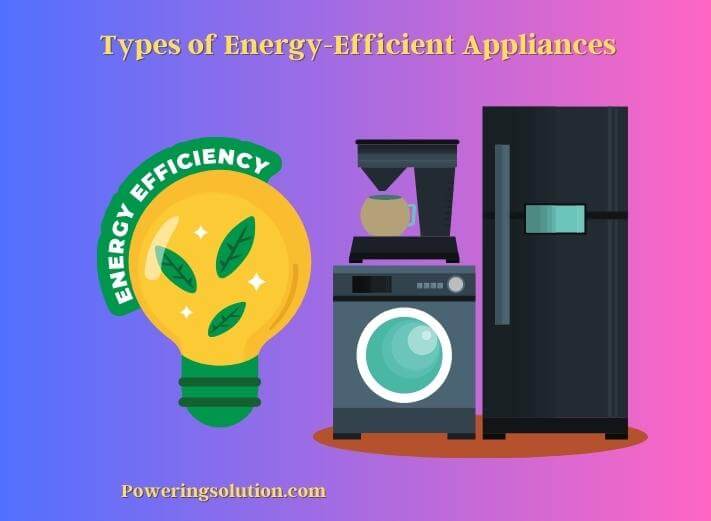
There are many types of energy-efficient appliances available to choose from, and they can save you money on your utility bills while also reducing your environmental impact. When shopping for energy-efficient appliances, look for the ENERGY STAR label, which indicates that the appliance meets strict energy efficiency guidelines set by the U.S. Environmental Protection Agency.
The Benefits of Energy-Efficient Appliances
Investing in energy-efficient appliances offers several benefits, including:
Lower Energy Bills
One of the most significant benefits of energy-efficient appliances is that they can help lower your energy bills. These appliances use less energy than traditional appliances, which means you’ll spend less money on electricity and gas each month.
Reduced Carbon Footprint
Energy-efficient appliances also have a much lower carbon footprint than traditional appliances. By using less energy, they help reduce the amount of greenhouse gas emissions produced by power plants. This can help slow the pace of climate change and protect the environment for future generations.
Increased Home Value
Energy-efficient appliances can also increase the value of your home. Many homebuyers are looking for homes that are energy-efficient, and having energy-efficient appliances can be a significant selling point.
Rebates and Incentives
Many utility companies and government programs offer rebates and incentives for investing in energy-efficient appliances. These programs can help offset the cost of purchasing and installing new appliances, making it even more cost-effective to invest in energy-efficient models.
How to Choose Energy-Efficient Appliances?
When shopping for energy-efficient appliances, there are several factors to consider:
Energy Star Certification
The Energy Star certification is a symbol of energy efficiency. Appliances with this certification have been independently tested and verified to meet strict energy efficiency guidelines. Look for appliances with the Energy Star label to ensure you’re getting a truly energy-efficient appliance.
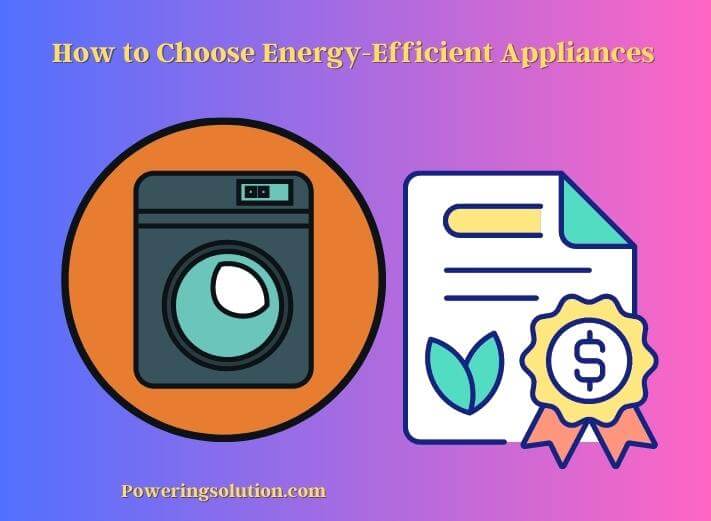
Size and Capacity
Choose appliances that are the right size for your needs. Larger appliances may be more energy-efficient in the long run, but if they’re too big for your needs, you’ll end up wasting energy and money.
Features and Settings
Look for appliances with features and settings that can help reduce energy usages, such as timers, energy-saving modes, and sensors that automatically adjust the appliance’s settings based on the load.
Maintenance Requirements
Consider the maintenance requirements of the appliance. Appliances that require frequent maintenance, such as cleaning or filter replacements, may end up costing more in the long run.
Calculating the Savings from Energy-Efficient Appliances
Investing in energy-efficient appliances, not only benefits the environment but can also lead to significant savings on your utility bills. Here are some tips on how to calculate the potential savings from energy-efficient appliances:
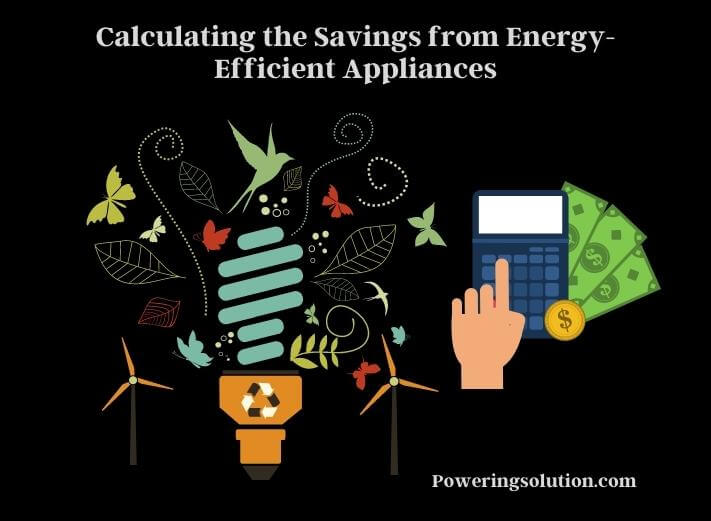
- Look for the ENERGY STAR label: When shopping for energy-efficient appliances, look for the ENERGY STAR label, which indicates that the appliance meets strict energy efficiency guidelines set by the U.S. Environmental Protection Agency.
- Calculate the energy savings: ENERGY STAR-certified appliances typically use 10-50% less energy than standard models, depending on the appliance type. Use an online energy savings calculator to estimate the potential savings of upgrading to an energy-efficient appliance.
- Consider the lifetime costs: While energy-efficient appliances may have a higher upfront cost than standard models, they can lead to significant savings over the lifetime of the appliance. Consider the lifetime costs of the appliance, including the purchase price, energy savings, and maintenance costs, to determine the overall value.
- Factor in rebates and incentives: Many utility companies offer rebates and incentives for purchasing energy-efficient appliances. Check with your local utility company or state government to see if you qualify for any incentives.
You can calculate the potential savings of upgrading to energy-efficient appliances and make an informed decision about which appliances to purchase. Remember, investing in energy-efficient appliances is an investment in your future, leading to lower utility bills, a reduced carbon footprint, and a more sustainable lifestyle.
Rebates and Incentives for Energy-Efficient Appliances
In addition to the potential savings on your utility bills, there are often rebates and incentives available for purchasing energy-efficient appliances. The federal government offers tax credits for certain energy-efficient appliances, such as heating and cooling systems, water heaters, and solar panels. The credits can be up to 30% of the cost of the appliance, with a maximum credit of $1,500 per household.
Many states offer rebates for purchasing energy-efficient appliances, often through the local utility company. Rebates may be available for appliances such as refrigerators, washing machines, and dishwashers.
Some utility companies offer rebates for purchasing energy-efficient appliances, as well as for installing certain energy-efficient features in your home, such as insulation or weather stripping.
Some appliance manufacturers offer rebates for purchasing their energy-efficient products. Check with the manufacturer or retailer to see if any rebates are available.
Some lenders offer energy-efficient mortgages, which allow homebuyers to finance energy-efficient upgrades to the home, including the purchase of energy-efficient appliances.
If you want to know about Delta-Conversion UPS vs. Double-Conversion UPS, read the article for details information.
Installation and Maintenance of Energy-Efficient Appliances
Installation and maintenance are important factors to consider when investing in energy-efficient appliances.
Proper installation of your appliance is crucial for optimal performance and energy efficiency. Follow the manufacturer’s installation instructions carefully, or hire a professional installer to ensure that the appliance is installed correctly.
Regular maintenance of your appliance can also improve its energy efficiency and extend its lifespan. Follow the manufacturer’s recommended maintenance schedule, which may include tasks such as cleaning filters and coils, checking for leaks, and replacing worn parts.
Many energy-efficient appliances have energy-saving settings that can further reduce energy consumption. For example, a programmable thermostat can automatically adjust the temperature when you are away from home, reducing energy use and lowering your utility bills.
Proper use of your appliance can also improve its energy efficiency. For example, only run the dishwasher when it is full, and use the appropriate cycle for the load size. Similarly, only do laundry when you have a full load, and use cold water whenever possible.
Regular inspections can help detect any issues with your appliance before they become major problems. Have your appliance inspected by a professional at least once a year to ensure that it is running efficiently and safely.
The Relationship Between Energy Efficiency and Sustainability
Energy efficiency and sustainability are closely related concepts that are essential for protecting the environment and ensuring a livable future for generations to come.
Energy efficiency refers to the practice of using less energy to accomplish the same task or achieve the same outcome. This can be achieved through the use of energy-efficient appliances, as well as through behavioral changes such as turning off lights when they are not in use or adjusting the thermostat to reduce energy consumption.
Sustainability, on the other hand, refers to the ability to meet the needs of the present without compromising the ability of future generations to meet their own needs. This includes considerations such as environmental protection, social responsibility, and economic viability.
Energy efficiency is an important component of sustainability, as it helps to reduce the environmental impact of energy consumption. By using less energy, we can reduce greenhouse gas emissions, which contribute to climate change, and conserve natural resources such as fossil fuels.
The environmental benefits and energy efficiency also have economic and social benefits. By reducing energy consumption, we can lower our utility bills and save money over the long term. This can be particularly important for low-income households, who may spend a larger percentage of their income on energy costs.
Furthermore, energy efficiency can also create jobs and promote economic growth. The development and deployment of energy-efficient technologies and practices can create new industries and job opportunities, and can also help to reduce dependence on foreign energy sources.
Can Energy-Efficient Appliances Benefit from the Use of Online UPS Systems?
Energy-efficient appliances can greatly benefit from the use of online UPS systems to ensure a secure power supply. These systems provide continuous power and protect against fluctuations, ultimately extending the lifespan of the appliances. With a secure power supply, energy-efficient appliances can operate optimally and effectively reduce energy consumption.
Wrapping Up a Conclusion
Investing in energy-efficient appliances is not only a smart financial decision, but it is also an investment in a sustainable future. By reducing energy consumption and lowering our carbon footprint, we can help protect the environment and ensure a livable future for generations to come.
Energy-efficient appliances come in a variety of types and models, and they offer a range of benefits such as lower energy bills, rebates and incentives, and improved performance. By calculating the savings from energy-efficient appliances, we can see just how much money we can save over the lifetime of the appliance.
The financial benefits and energy-efficient appliances also have a positive impact on the environment and society. They help to reduce greenhouse gas emissions, conserve natural resources, and create new jobs and industries. Rebates and incentives for energy-efficient appliances also make them more accessible and affordable for all households.
Proper installation and maintenance of energy-efficient appliances are also crucial for optimal performance and energy efficiency. By following the manufacturer’s instructions and using energy-saving settings, we can further reduce energy consumption and improve the appliance’s lifespan.
